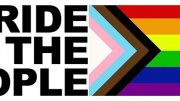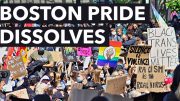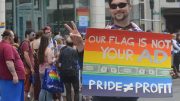Trans Resistance March & Vigil
By: Mike Givens/TRT Assistant Editor—
The weather that day saw a low of 63 degrees and a high of 75; a perfect day for congregating, fellowshipping, and marching. Saturday, June 13, originally designated as the date for the Boston Pride Parade and Festival, would instead become a day to honor the power, beauty, and resilience of Black trans people.
“My initial desire to organize a march came from an article I read about Los Angeles Pride marching in solidarity with Black Lives Matter,” said Jessica “Frenchy” French, one of the co-organizers of that Saturday’s Trans Resistance Vigil and March. “I immediately thought, ‘Why isn’t Boston Pride doing this?’”
French said she and a few others set about coordinating their own event to honor Black lives.
“After Boston Pride’s failed public message about Black Lives Matter, we took things into our own hands,” she said. “My reaction to that thought was reaching out to local queer leaders in Boston to put [an event] together.”
Black trans leaders like French, Athena Vaughn, Tre’Andre Valentine, and Chastity Bowick came together to organize an event providing visibility to Black trans lives.
“We did that in a week,” French said. “Without corporate sponsors, without police, without thousands of dollars.”
On the afternoon of June 13, a vigil was held in Playstead Field in Franklin Park, a public recreation area near a predominantly Black neighborhood in Boston’s Dorchester suburb. After the vigil, the crowd marched to Nubian Square, in the nearby suburb of Roxbury.
“I want to take back the power that was given to others to create space and create community for us by us,” said Vaughn, who estimates that 2,500 people attended the event. “It was not being done by those who have claimed to have been doing it for so long, but have failed at it so miserably.”
Vaughn said it felt like a “slap in the face” for an organization like Boston Pride, an institution with roots in a resistance driven by Black trans people, to, “support and stand in solidarity with” the police instead of Black Lives Matter.
“Trans women are dying everyday and no one is marching, no one is speaking, no one is demanding change and enough is enough,” she said. “We need our space, we need to speak for ourselves … I said it is time for Black trans excellence to lead for itself, time for us to speak up for ourselves, time for us to advocate and fight for ourselves.”
Kimm Topping, a member of the trans community, attended the event and said they were touched by its intention, but also by the opportunity to support the leadership of others.
“I was eager to support an event centering Black trans leadership,” they said. “The non-profit industrial complex has a real problem with hoarding resources and putting white folks in leadership positions, while organizations led by Black trans women fight for resources. This gathering envisioned a future that shifts our priorities to where they should have been in the first place. Transgender people of color and sex workers began the movement and have since been degraded by LGBTQ+ rainbow capitalism. It’s time for a change and I was grateful to participate.”
Topping said that the vigil and march was a direct expression of what real genuine community looks like.
“It was a caring, community space filling the park,” they said. “It returned us to the roots of Pride—a protest, march, and vigil led by Black trans people. The event centered humanity and community, instead of capitalism and elitism. Free water, personal protective equipment, food, herbs and flowers, and signs were available to everyone. Every few minutes, you’d see a community member walking through the crowd offering supplies. The pace of the march was set by folks with disabilities who were asked to lead the front of the march. There was a real sense of togetherness and love. As we walked through the streets, people chanted with us, beeped their horns, and volunteers passed out water.”
Bowick, who co-lead the event along with Vaughn, French, and Valentine, said that she was appreciative of the community for its solidarity.
“It was emotional and I was very grateful for everyone who came out to support,” said Bowick, who administers the Massachusetts Transgender Emergency Fund (TEF).
Bowick said that the Fund, which the vigil and march raised money for, has passed $120,000 in donations.
“I became involved in organizing Trans Resistance because I never saw myself or my community—trans and POC—reflected at Boston Pride … ever,” said Valentine, executive director of the Massachusetts Transgender Politial Coalition (MTPC) who co-lead efforts to organize the event. “Additionally … for five years now, the community has been demanding that there be changes in Boston Pride and on the Pride board. All of which have been met with hostility, dismissal, and performative actions and statements.”
The march and vigil has also become a referendum on Boston Pride, which has a long history of allegations of racism, transphobia, and cultural insensitivity. A group of former board members and volunteers have initiated a public campaign to overhaul the leadership of Boston Pride.
Said Topping, “For years, we have been protesting Boston Pride and demanding that the organization better reflect the needs and leadership of the community. They have not met those demands and continue to perpetuate racism through their actions and refusal to step down. A few years ago, we interrupted Pride by stopping the parade to read the names of trans people of color killed that year. Centering people whose lives have been taken by violence and centering Black trans leaders doing the work in our city for decades should always be central to our gatherings. Trans Resistance reminded us what community care really looks like and we will look to their leadership for the future of Boston pride events.”
Valentine echoed Topping’s contention and discussed how vigils and marches, at their core, seek to right a wrong, not just with Pride institutions, but with society in general.
“Marches and vigils are not born out of importance, they are born out of hurt and frustration, and of the experience of immense ongoing silence and violence,” he said. “And Black and brown, indigenous, disabled trans people are tired of being pushed aside, violated, raped, and murdered. We have as much right to life, love, healthcare, education, employment, stable housing and success as anyone else.”
For French, this event is only the beginning of a longer march towards equality and justice.
“Trans resistance didn’t end at the march,” she said. “We are not done. We will be having our own Pride in 2021. We look forward to continuing [our] vigils and marches until the world believes that all Black Lives Matter.”







